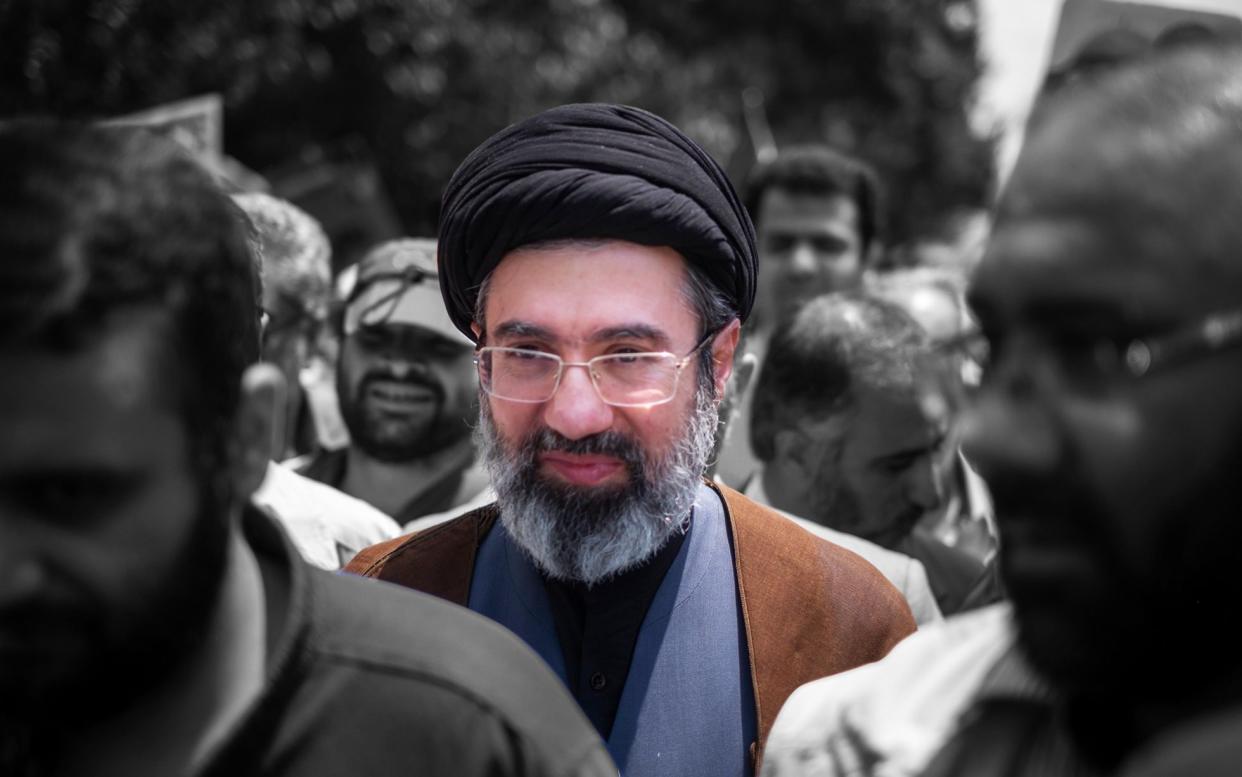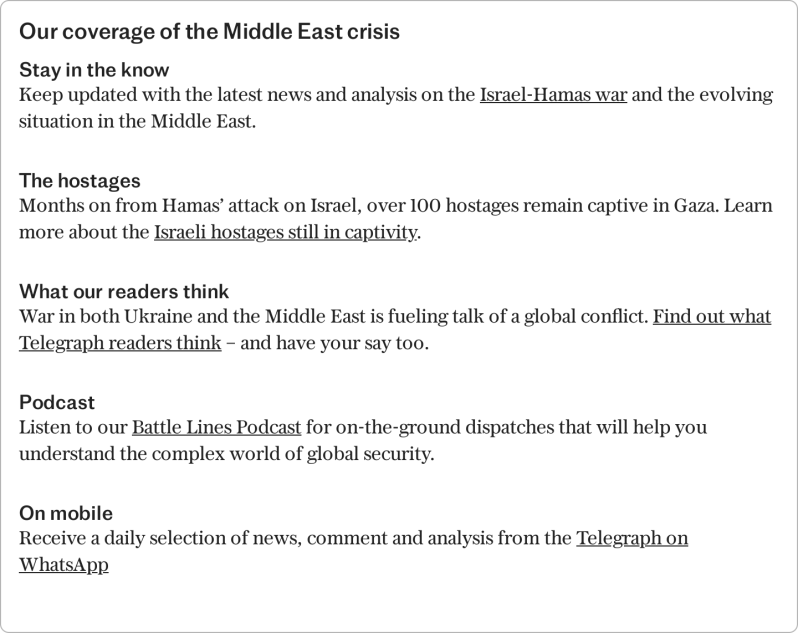Iranian president’s helicopter crash death clears field for Khamenei’s son

On Sunday, two men were thought to be in the running to be the next all-powerful supreme leader of Iran.
On Monday morning, one of them was found dead in the wreckage of a helicopter crash on a mountainside.
Keen observers of Iranian regime politics believe Ebrahim Raisi, the late president of Iran who was killed on Sunday night, was being groomed as a potential successor to take over from Ayatollah Ali Khamenei, 85.
Up against him was thought to be the Ayatollah’s son, Mojtaba Khamenei – who is now, perhaps, the only man standing for the job.
The strongest hint of a succession plan involving Mojtaba came in the form of a picture released by the regime last month showing the elder Khamenei slouched in a chair while addressing rows of turbanned clerics and decorated generals.
The careful angle of the photograph placed his son, shrouded in a brown robe, directly to the right of the supreme leader. It was Mojtaba’s first documented appearance in years at a high-level meeting. To the right of Mojtaba sat the late Raisi.
Who will be the new president of Iran?
The ground was already being prepared for a possible succession in March, when moderate candidates were disqualified from standing for a spot on the body tasked with selecting the next leader.
The hardline and influential Guardian Council crossed names off the list, including Hassan Rouhani, the former Iranian president who is considered to be relatively moderate and someone who could have posed a political challenge.
This ensured that the Assembly of Experts – a group of 88 Islamic jurists responsible for naming the next supreme leader – would be stacked with Khamenei’s associates, paving the way for Mojtaba.
At 54, Mojtaba – whose name means “chosen” in Farsi – has burnished his credentials within Iran’s clerical establishment, its feared Islamic Revolutionary Guard Corps (IRGC), and various security agencies.
Even before Raisi’s death, Mojtaba was beginning to outshine the late president – whose leadership dissatisfied many, given growing economic woes and much corruption – as described to The Telegraph by IRGC commanders, members of the Basij paramilitary force, and Iran experts.
A lanky, hapless teenager
Mojtaba exploded into the public eye at the age of 17, when he disappeared for a week in March 1985 while serving on the front lines of the Iraq-Iran war. At the time, his father had yet to ascend to the role of supreme leader.
Then, there was little to indicate that a lanky teen – viewed by IRGC commanders as hapless in war – would someday be tipped for the regime’s elite ranks.
Ali Fazli, a commander of the IRGC during the war, later wrote in his memoir: “His martyrdom is not a problem, but if he is captured, it will be very costly for us in terms of publicity.”
Mojtaba was later rescued along the border with Iraq, and has since managed to turn the tables in his favour – despite not holding an official position within the regime.
“Top commanders are speaking very highly of him,” a member of the IRGC told The Telegraph.
He has become so influential that he even holds secret meetings daily with many IRGC commanders, said a professor of political science in Iran, whose name has been withheld as it is too dangerous to openly discuss the issue of succession.
Mojtaba has also successfully pulled the political strings at least twice – in 2005, and then again in 2009, when he’s believed to have manipulated elections in favour of Mahmoud Ahmadinejad.
Ahmadinejad held the presidency for eight years until 2013.
Hard-line inner circle
Clues on how Mojtaba might lead can be gleaned from the policies of his hard-line father, as well as his own inner circle.
That group includes some of Iran’s most ideologically extreme clerics: Mehdi Taeb, the brother of a former IRGC intelligence head; Alireza Panahian, who plays a leading role in the IRGC’s indoctrination programme; and Mohmmad Qomi, head of the Islamic Propaganda Organisation, according to a 2023 report by the Atlantic Council.
But even with the elder Khamenei’s careful positioning, Mojtaba’s ascent won’t be certain until it happens.
First, it would be unprecedented – in 1989, the son of Iran’s first supreme leader failed in his attempt to succeed his father, Ayatollah Ruhollah Khomeini.
Public opposition is also expected – chants calling for the younger Khamenei’s death circulated during mass nationwide protests in late 2022: “Mojtaba, you will die; you will never see the leadership.”
But the regime is likely to reach into its usual playbook and respond with brute force, as it did in response to protests nearly two years ago, and as it appears poised to do again now to maintain order in the aftermath of Raisi’s death.
The answer is “very simple”, a member of the Basij paramilitary group in Tehran told The Telegraph. The IRGC “will use force to silence any opposition to Mojtaba’s leadership”, he said.
The source said the expectation is for “a big movement and protests after the death of the [supreme] leader, and even more with the selection of Mojtaba”.
He added: “That is why they are preparing to suppress that uprising. The suppression of protests which you see in recent years is just a warm-up for the ultimate one, which will happen after the death of the leader – God forbids.”
It isn’t a surprise that the regime is already bracing for this. Times of leadership transition in any nation are amongst the most delicate and risky periods.
Iran treads water with Mokhber
Iran, for now, is treading water. Mohammed Mokhber, Raisi’s first deputy, has been named acting president, in accordance with the current constitution.
And as Khamenei “makes all the key decisions in the Islamic Republic, while the president carries out his vision…[that means] there will be continuity with the country’s domestic and foreign policies”, said Holly Dagres, a non-resident fellow and Iran specialist at the Atlantic Council, a US think tank.
For the Islamic Republic, the concern is that the general public could seize the opportunity to rise up and force the regime’s grip to loosen.
But at least for now, with Raisi completely out of the picture, Mojtaba indeed looks poised to skate smoothly to the top. “It seems they have already chosen Mojtaba,” said a member of the IRGC.
He added: “Some time ago, after a nighttime prayer, one of the commanders prayed for the health of the leader and then Mojtaba, to which we had to say amen.
“They will deploy us to defend his leadership. That’s our job.”


 Yahoo News
Yahoo News 
